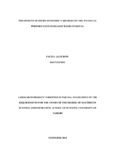| dc.description.abstract | During the last two decades, the banking sector all around the world has experienced
major transformations in its internal and external environment, resulting in significant
impacts on its performance. Islamic banking is one such transformation which can be
termed as the the future of the banking industry since even the religion boundaries
could not hold it back. It involves provision of banking services within the Islamic
religious guidelines, hence the name islamic banking. However, though it is termed as
the future of banking, very few people in Kenya know of this financial product and
hence its use in the country is at its conception stage even though it has been in the
country for the last seven years. There exists many studies directed towards explaining
Islamic banking, but little is known on micro economic factors influence on the
financial performance of Islamic banks in Kenya. This study aimed at providing more
information about islamic banking by looking at the micro economic factors affecting
performance of the banks pegged on the pecking order theory, adaptive market
hypothesis theory and the trade-off theory. The study used a descriptive research
design targeting the 10 banks in kenya with Islamic banking, 2 fully fledged and 8
have Islamic banking window, from whom information on assets, income, expenses,
capital, and performance ratios were collected, from which the study findings were
made. Islamic banking sector was observed to be attractive and highly profitable. It
was found that capital adequacy, asset quality, management efficiency, earning quality
and liquidity management all affected the performance of Islamic banking
performance in Kenya. The study recommends that sensitization should be carried out
to enhance the knowledge on Islamic banking in the Kenyan market, which many do
not know. The study suggested further study to determine macro-economic factors
affecting financial performance in Islamic banking in Kenya with a view to go beyond
the study‘s scope. | en_US |

